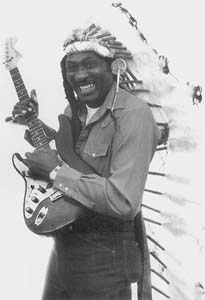![[Metroactive Music]](/music/gifs/music468.gif)
[ Music Index | Metro | Metroactive Central | Archives ]
Blues for a Living
Eddy 'The Chief' Clearwater embraces rock and country in his blues
By Nicky Baxter
THERE ARE MORE blues players around than one can count, but only a handful can be considered artists. The difference is telling. Although the former may possess enough talent to avoid unemployment, the latter use their gifts in a manner that compels attention.
Blues artists are almost always multi talented: equally adept at playing, singing and songwriting. And more often than not, their stage performances are standing-ovation affairs. Eddy "The Chief" Clearwater--who plays JJ's Thursday (Nov. 19)--is an artist in every sense of the word.
Raised in Birmingham, Ala., on a steady diet of gospel, blues and country & western, Clearwater (born Eddie Harrington) arrived in Chicago in 1950 with dreams of being a bluesman. On the gospel circuit, he'd already played guitar behind a number of nationally acclaimed acts, most notably the Five Blind Boys of Alabama.
"I always had blues in my heart and soul," Clearwater says. "That was what I always wanted to do. So when I got to Chicago and heard Muddy Waters, Lightnin' Hopkins and John Lee Hooker, that just clinched it for me."
It was the sound of West Side Chicago blues, however, that really turned the young guitarist's head. During this period, bluesmen like Otis Rush, Buddy Guy and Magic Sam were working out a sound that was raw and frenetic yet more urbane than the South Side's rude take on Delta blues .
Clearwater, who was then going by the name of Guitar Eddy, recalls the Chicago scene back then: "Things were very healthy. Seemed like on every corner there was a blues club. All the clubs were in black neighborhoods at that time."
On any given night, blues fans could hear the likes of Jimmy Reed, Otis Rush, Willie Dixon and Muddy Waters bash out stormy, sweat-drenched sets in crowded juke joints. Guitar Eddy, who would soon change his stage name to Eddy Clearwater in tribute to Muddy Waters, absorbed all he heard; the style he developed, however, was uniquely his own. The blues anchored his sound, but what set him apart was his embrace of C&W, roots-rock and rockabilly.
"I always liked Chet Atkins and Hank Williams Jr.," Clearwater explains. "The lyrics and the sound of the guitar really hit home." As for rockabilly, it was all about Carl Perkins' relentless beat. (To this day, Clearwater still gets a buzz whenever he hears a Stray Cats tune.) When he stumbled onto Chuck Berry's country-tinged rock, all the pieces fell into place.
SONG TITLES like "Hill Billy Blues," "Twist Like This" and "A Little Bit of Rock & Roll" hint at the eclectic nature of the native Mississippian's repertoire. "Blues for a Living," "Nashville Road," and "Boppin' at the Top of the Rock" (from his current Bullseye release, Cool Blues Walk) showcase Clearwater's uncanny knack for sharp-eyed storytelling and a vocal approach that is by turns churchy, countrified and rockin'. Slicing through everything is his deft, imaginative guitar playing bouncing effortlessly from genre to genre.
"Some people describe my [guitar] style as 'rock-a-blues,' Clearwater says, "because the sound is between rockabilly, country and blues." Others have tagged his music high-energy blues because of Clearwater's penchant for upbeat numbers.
Produced by blues-rock veteran Duke Robillard, Cool Blues Walk contains some of Clearwater's best work to date. The title track is a chugging, midtempo ditty powered by stabbing horns, boogie-based piano and Clearwater's piercing lead and surging rhythm playing. The song's lyric artfully describes the rhythmic strut of patrons entering and exiting a club to the beat of Clearwater's multihued blues. "That song came out of an idea from working Chicago clubs," Clearwater reports. "I can see people walking in with a certain bounce based on the music."
A percolating New Orleans groove defines "Very Good Condition." Rollicking piano and bright, punchy brass curl around the pulse as the lyric tells a decidedly personal story. A few years ago, the singer/guitarist was hospitalized due to heart problems. As it turns out, the doctors performing the double-bypass surgery were big fans of his music.
"I had no idea they knew who I was!" Clearwater says. "They told me later that they played my music throughout the surgery--five hours! Afterwards, the doctors said, 'You're in very good condition, considering the shape you're in.' " After his release, Clearwater went home and promptly banged out a song about the experience. Transforming pain into art--that takes a whole lot of heart, and a little bit of soul.
[ San Jose | Metroactive Central | Archives ]
![]()
 A Little Bit of Rock & Roll: Guitarist Eddy Clearwater has always been eager to bring other genres into the big tent of the blues.
A Little Bit of Rock & Roll: Guitarist Eddy Clearwater has always been eager to bring other genres into the big tent of the blues.
Eddy Clearwater performs Thursday (Nov. 19) at 8:30pm at JJ's Blues, 3439 Stevens Creek Blvd., Santa Clara. Tickets are $8. (408/243-6441)
From the November 19-24, 1998 issue of Metro.